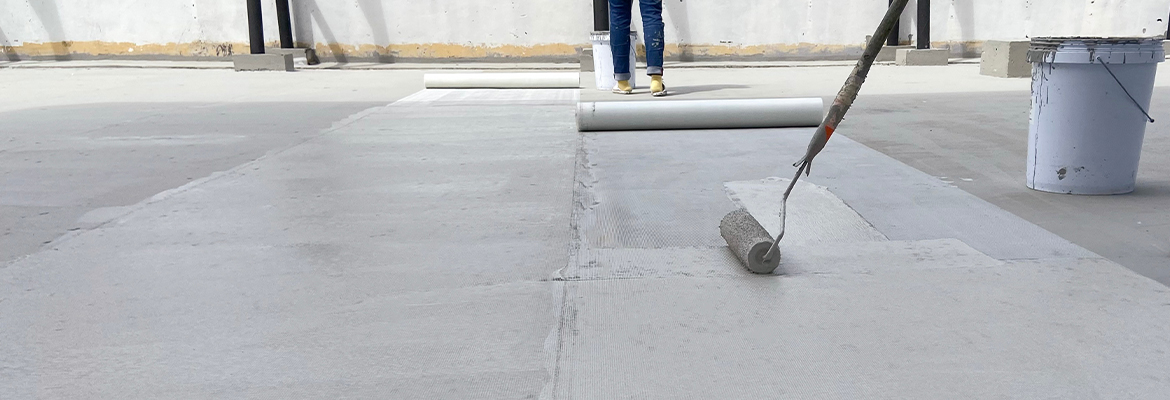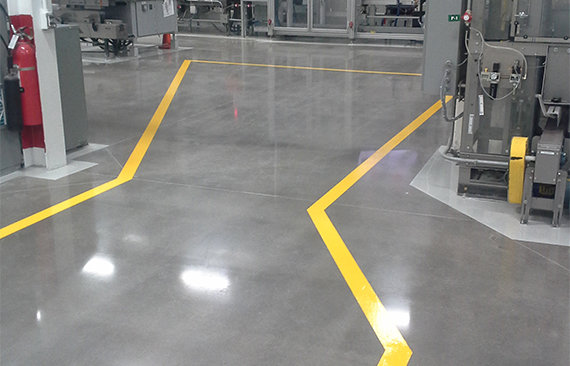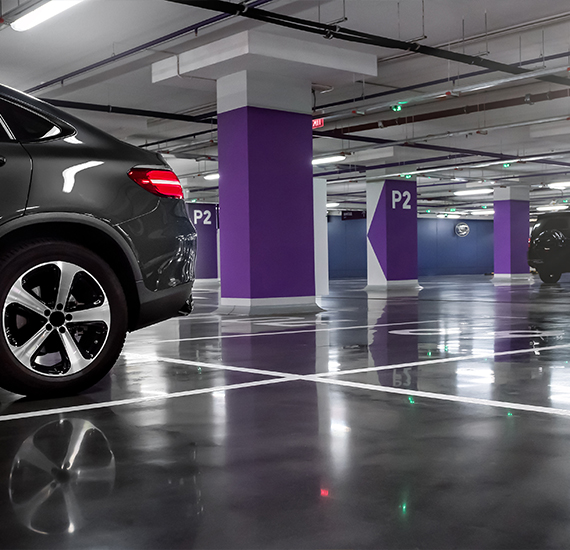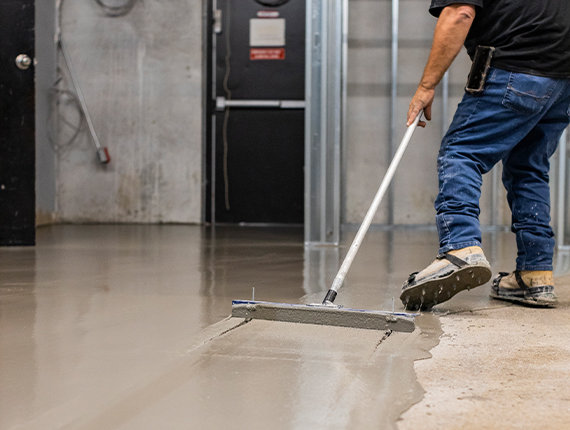Concrete is a very stable and durable structure when used and maintained properly. Unfortunately, concrete is also very porous, and it is susceptible to water, chemical, abrasion, salt attack, and even UV damage from sunlight.
When installing concrete in high traffic or outdoor areas it is very important to consider using a traffic coating. BNE can recommend when you would need a coating and which type of coating for:
Parking garages
Parking decks and ramps
Stadiums
Arenas
Footbridges
Walkways
Mechanical rooms
Plaza decks
Balconies
Roof top terraces
BNE can protect your concrete floors in high traffic areas or outdoor spaces.
CONTACT OUR SALES REPProtecting your investment is very important. You can increase the longevity and reduce replacement costs by sealing or coating your concrete slabs to prevent damage. The type of coating you use is important as the coating must be formulated to withstand the type of attacks specific to your installation:
If the concrete is outdoors, it can be exposed to weather (snow, rain, UV)
In the winter, it can be exposed to de-icing compounds and salt
Water damage – which leads to corrosion of rebar
Heavy Traffic abrasion
Oil and Chemical attack
Once water or salt reaches the structural rebar it can cause it to corrode and rust. If the rebar is compromised the concrete slab will form cracks or lift in spots. De-icing salt, combined with ice formation on the surface of the concrete can lead to scaling; small chips that flake off from the surface.

Concrete Floor Traffic Coatings come in a variety of formulations such as pedestrian traffic coatings, vehicle traffic coatings, PMMA or PUMA coatings. Traffic coatings can also be referred to as Elastomeric Traffic Coatings or Traffic Coating Membranes.
There are numerous benefits to installing a proper traffic coating which extend the lifespan of the structure:
It will be waterproof
The slab can repel weather and salt
It protects the concrete substrate from chemicals like oil or gasoline
It protects the steel rebar structure
Makes the slab resistant to UV damage
Fills in small cracks and fractures and is seamless
A good waterproof traffic coating protects your investment and can also help make the concrete look nicer with an array of decorative options available. These coatings are also very useful in any area where there is a risk of flooding.
The traffic coating will stay permanently flexible so that any minor cracks, less than 1/16 of an inch, that occur in the concrete surface, for example from shifting or settling, would remain sealed and protected.
There are several different formulations of traffic coating, each one suited to a particular task.

Frequent pedestrian traffic will cause wear on the concrete surface. Over time, this will affect the condition and the longevity of the concrete slab. Abrasion damage from traffic is just as damaging as weather damage such as freezing and thawing. Walkable areas with day-to-day foot traffic require long-term waterproofing and abrasion protection.
Pedestrian traffic coatings are very similar to vehicular traffic coatings except that they are applied thinner and have less chemical resistance. Pedestrian traffic coatings are often applied for safety in high traffic areas to identify walking paths.
Concrete that is driven upon has a unique set of conditions that require a little more protection. First, they may be open to the outdoors – the top floor of a parking structure is often an open-air environment, and the sides of the garage are usually open to the elements as well.
Not only is the slab exposed to weather, including changes in temperature. It is also exposed to heavier traffic than pedestrian areas. Cars, trucks, and other motor vehicle deteriorate the surface faster through abrasion. It is critical that your coating has the characteristics to resist load and shear forces and is UV resistant, especially on ramps and traffic aisles vs in parking stalls.
Thirdly, garages are prone to multiple chemical attacks as well. Poorly maintained vehicles can leak oil, gasoline, and other chemicals onto the concrete surface further damaging its integrity. Vehicles also track in de-icing chemicals and salt.
Traffic coatings are essentially mandatory if you want to keep lifetime costs down.
While costly to install, traffic coatings can save you a lot of money in structural repairs, replacement of concrete and rebar) in any garage type environment – whether it is a mechanic shop or a parking structure. These coatings not only help with protecting the concrete from attack, but they also improve visibility by reflecting light sources, and improve slip resistance by increasing traction.

Once properly applied, and with regular maintenance, a traffic coating will give high performance protection for years to come extending the life of your concrete slab and saving you expensive repair or replacement costs.
To be installed properly, the coating does require a properly installed and prepared substrate. Not only does the coating have to be mixed properly, but the surface also must be:
BNE are experts in all the products we use, in fact, the manufacturers will often come to our job sites to see how we’ve applied their products. It’s important that the type of coating that is applied is the right coating for that specific usage. Other factors that can influence the type of coating to use would be aesthetic concerns about the look, water mitigation or re-direction, and chemical resistance.
Not only should you learn which product is best for your application, you should also research your installers thoroughly. Ask to see references and call those references! Your contractor should be an expert in installation and maintenance of the product, just like BNE.
MMA or Methyl-Methacrylate coatings have a very fast cure time which will reduce the downtime waiting for the coatings to dry. They also have improved performance features, like being able to re-coat when maintenance is required.
PMMA or Poly-Methyl-Methacrylate coatings have been experiencing a growing demand due to the speed of turnaround in operational garages their durability, high chemical resistance, and warranties. These coatings are just chemically stronger. In fact, the same chemicals are used in dental fillings, road markings and glass.
Their fast cure times means downtime is usually less than 8 hours, including in extreme temperatures, before traffic can be reintroduced. This means businesses can re-open faster reducing costs due to lost revenue.
PUMA or Poly-Urethane-Methacrylate is a cold-applied membrane system that offers superior elongation over MMA/PMMA and is ready to use 1 hour after application. PUMA coatings are ideal for split-slab, paver systems, planters, and vegetated rooftops. PUMA coatings can be used as both traffic coatings and below grade applications.
Not sure which product is right for your project?
Speak with our expert team at BNE and we can help advise you on the perfect product to meet your needs.
CONTACT A BNE EXPERT
Mechanical rooms are found in commercial, industrial, high rise, health care and just about any large building. Mechanical rooms house some of the buildings most valued mechanical equipment included electrical panels, chillers, boilers, and HVAC equipment.
The growing demand for energy efficient buildings has increased the need to ensure the concrete floors that house the equipment in these rooms will provide protection against water and moisture.
Mechanical equipment is expensive and essential to the daily building operations. So, selection of the right floor in these environments is critical to avoid costly damage and downtime caused from unexpected water leaks.
Consideration for selecting the right fit floor for your mechanical rooms should entail:

Controlling moisture vapor transmission is critical to the long-term performance of any slab-on-grade or slab-above-grade flooring. Standard industry practice dictates that your concrete will dehydrate at 1 inch (25mm) per month under controlled conditions. So, a 6” (150mm) thick concrete slab can take up 6 months to fully dehydrate and be ready to receive flooring.
Failure to wait long enough for the concrete to dehydrate can be catastrophic leading to partial delamination or a full out flooring failure. Application of a proper moisture vapour floor coating system provides assurance the floor system is going to stick and stay bonded.
So, whether your project is an operating room in a Health care centre or the Rink tile in an Arena we have a Moisture vapour control solution to look after your needs.
A concrete floor traffic coating is a protective layer applied to concrete surfaces to shield against water, chemicals, abrasion, salt, and UV damage. It’s essential for prolonging the life of concrete in high-traffic and outdoor areas.
There are several options, including pedestrian traffic coatings, vehicle traffic coatings, elastomeric membranes, and specialized coatings like MMA, PMMA, and PUMA.
Traffic coatings make concrete waterproof, protect it from weather and chemical damage, shield the underlying rebar, resist UV damage, and seal small cracks, increasing durability and longevity.
Pedestrian coatings are applied thinner and offer basic protection, while vehicular coatings are thicker, provide more chemical resistance, and withstand heavier load and abrasion, ideal for ramps and parking garages.
By preventing water and salt from penetrating the concrete, traffic coatings help protect the steel rebar from rust and corrosion, which can weaken the structural integrity of the concrete slab.
Scaling is when small chips flake off the concrete surface, often due to freeze-thaw cycles and salt exposure. Traffic coatings help prevent scaling by waterproofing and sealing the surface.
MMA (Methyl-Methacrylate), PMMA (Poly-Methyl-Methacrylate), and PUMA (Poly-Urethane-Methacrylate) are fast-curing, durable traffic coatings with high chemical resistance, ideal for quick installations and operational areas.
Yes, certain traffic coatings offer decorative options, improving the appearance of concrete surfaces with customizable colours and finishes.
Waterproofing prevents moisture penetration, which can damage concrete, cause rebar corrosion, and lead to costly repairs, especially in high-moisture areas like parking decks and mechanical rooms.
Some coatings, like MMA and PMMA, cure in less than 8 hours, while PUMA coatings are often ready for traffic within 1 hour, allowing for minimal downtime.
MVM controls moisture vapor transmission from concrete, preventing flooring failures and ensuring long-term bond and durability, especially in slab-on-grade or slab-above-grade installations.
Traffic coatings are flexible and can seal minor cracks, maintaining a waterproof barrier and protecting against future damage from minor shifts or settling.
Regular inspections and reapplication as needed ensure the coating maintains its protective qualities, extending the life of the concrete slab.
Yes, traffic coatings can improve traction, making surfaces safer in areas like parking garages, walkways, and ramps.